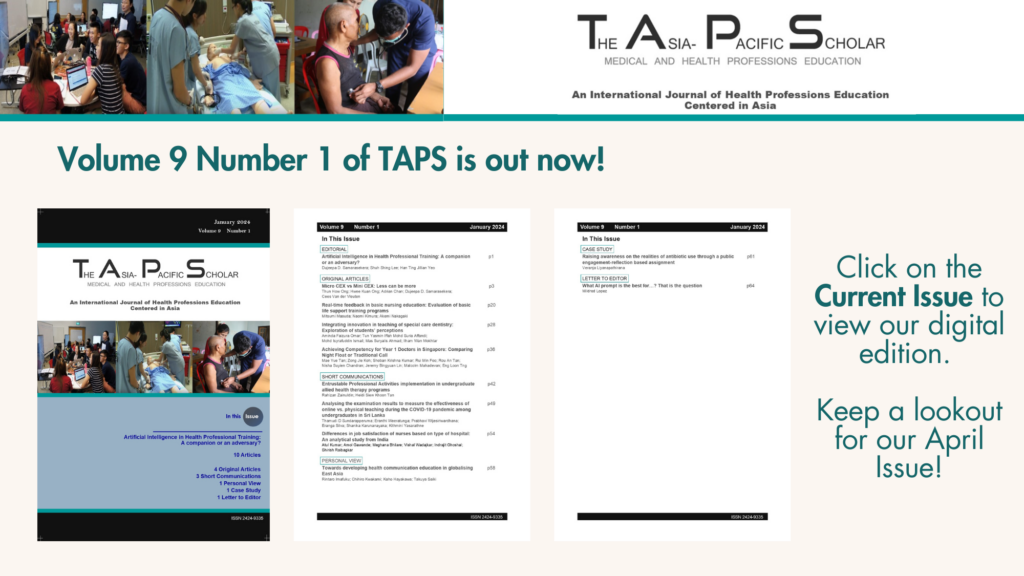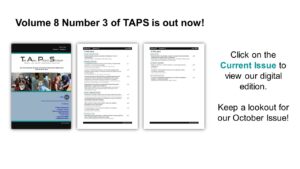Teaching ethics in the ICU: An experiential way of learning
Published online: 5 September, TAPS 2017, 2(3), 24-25
DOI: https://doi.org/10.29060/TAPS.2017-2-3/SC1042
Shahla Siddiqui
Department of Anaesthesia, Khoo Teck Puat Hospital, Singapore
Abstract
There is a gap between the teaching and practice of clinical ethics. Many students learn bioethics at an undergraduate level in lectures and through tutorials. They may also learn case based ethical reflection; however, discussing ethical issues of real ICU patients and families is a novel form of experiential teaching which engages undergraduate students and helps them see practical and quick consideration in very sick patients. Often ICU patients present complex and difficult ethical dilemmas which can demonstrate real life scenarios that students can relate to when learning in a classroom.
Keywords: Ethics Teaching, Interprofessionalism, Experiential Learning
I. INTRODUCTION
The The Intensive Care Unit is an environment where myriad complex clinical situations present and these are often closely intertwined with ethical dilemmas (Svantesson, Anderzén-Carlsson, Thorsén, Kallenberg & Ahlström, 2008). ‘Ethical dilemmas’ constitute many complex situations which can surround a patient’s clinical care that often involve an apparent mental conflict between moral imperatives, in which to obey one would be opposing the other (Braunack Mayer, 2001). Situations range from triage, surrogate decision making, organ donation, family communication and patient autonomy. An example of this may be a family insisting on non-beneficial life sustaining therapy in an elderly patient. Many times such situations are not explicitly presented to medical students and they rarely get a chance to witness how doctors deal with real complex clinical ethics issues in a situation where time is essence (Oberle & Hughes, 2001). Coping with these problems is crucial to the development of medical students and an exposure to how a multi-disciplinary team of doctors, social workers, nurses and palliative care physicians may help solve hard cases is very useful. The interaction and cooperation between different professions also helps to consolidate the roles of each allied health team and highlights to the medical student an integrated professional attitude (Udén, Norberg & Lindseth, 1992).
The aim of this educational qualitative study was to evaluate the narrative feedback of medical students after being exposed to Ethics rounds in a 14 bedded surgical ICU of a teaching hospital by a multi-disciplinary ICU team.
II. METHODS
After IRB approval, medical students posted to our hospital for an Anaesthesia rotation were invited to participate in the study. A verbal consent was obtained with specific instructions to maintain patient confidentiality. The author who is an intensivist led the rounds of all ICU patients. This included a multi -disciplinary round comprising of nurses, social workers and allied health staff such as a pharmacist, a physiotherapist and a dietician. All staff had been conducting daily ICU rounds on the patients and were familiar with their ethical issues. The students were briefed about ethics issues that may have arisen in each patient’s case and how they were resolved by the team. There was input from the other team members especially the social workers and the nurses. Students were encouraged to reflect and ask questions about each case and offer their own input. Some cases were straightforward and did not have many ethical questions, however some others had complex problems that needed more time. Some issues were resolved already whilst others were ongoing and the students were encouraged to offer solutions based on their past learning. All students belonged to the fourth year of medical school and had received a longitudinal ethics teaching. At the end students were asked to write down an anonymous narrative feedback for the author.
III. RESULTS
Overall the six medical students were very happy to be part of the 1 hour ICU ethics round. They appreciated the real life practical application of the issues facing a team of professionals daily and the aspects of care we need to consider when resolving such issues.
“ I felt that the session was very informative and helped clarify many perceptions we had towards the ICU.”
It reinforced their view of an inter-professional approach to ICU care:
“The involvement of other healthcare workers of the ICU team helped us better appreciate the multi- disciplinary nature of ICU care and the role each person plays.”
“Having the allied healthcare team there to offer their thoughts also brought a new perspective to patient care for me. I feel that these lessons are more valuable than what we may take away from a didactic lecture alone.”
They were able to appreciate the ethical challenges faced by the team:
“I really enjoyed it and it gave me an insight not only on the logistical side of the ICU but also the ‘heart’ behind it and the ethical dilemmas that the healthcare professionals go through every day.”
A patient perspective and human aspect was also highlighted by the input from nurses, physician and social workers which is different from the often cold clinical picture on rounds:
“It was interesting to learn about the various patients in the ICU and the challenges they themselves face in getting better.”
“This enabled us to tie in the things that we had heard of during lectures and tutorials, and the many issues that we may have not been exposed first hand to.”
The practical aspects of clinical care was exposed:
“It was also a good way to see the practical aspects of ICU care ….being able to see different ICU patients and hear their stories we got a real feel of the ICU”.
“We also felt easy asking pertinent questions about their management to you.”
IV. DISCUSSION
Experiential learning and case based clinical bioethics teaching is a practical and effective way of imparting explicit knowledge, skills and role modeling attitudes for medical students (Widdershoven, Abma & Molewijk, 2009). This should not be solely dedicated to ICU or for ethics. Many ethical issues faced in ICUs are commonplace in ward settings as well (Rathert & Fleming, 2008). Effective communication, empathy, cultural nuances and professionalism are all learning that medical students can pick up from such ethics rounds in the ICU.
Notes on Contributors
Shahla Siddiqui is a Senior Consultant and Intensivist as well as a graduate student in medical ethics.
Declaration of Interest
The author declares no conflict of interest.
References
Svantesson, M., Anderzén-Carlsson, A., Thorsén, H., Kallenberg, K., & Ahlström, G. (2008). Interprofessional ethics rounds concerning dialysis patients: Staff’s ethical reflections before and after rounds, Journal of Medical Ethics, 34(5), 407-13.
Braunack Mayer, A. J. (2001). What makes a problem an ethical problem? An empirical perspective on the nature of ethical problems in general practice. Journal of Medical Ethics, 27 (2), 98-103.
Oberle, K., & Hughes D. (2001) Doctors’ and nurses’ perceptions of ethical problems in end-of-life decisions, Journal of Advanced Nursing, 33(6), 707-15.
Udén, G., Norberg, A., & Lindseth, A. (1992). Ethical reasoning in nurses’ and physicians’ stories about care episodes. Journal of Advanced Nursing, 17(9), 1028-34.
Widdershoven, G., Abma, T. & Molewijk, B. (2009) Empirical ethics as dialogical practice. Bioethics, 23(4), 236-48.
Rathert, C., & Fleming, D. A. (2008). Hospital ethical climate and teamwork in acute care: The moderating role of leaders. Health Care Manage Review, 33(4), 323-31.
*Shahla Siddiqui
Tel: 0065 66022137
Email: shahlasi@yahoo.com
Announcements
- Fourth Thematic Issue: Call for Submissions
The Asia Pacific Scholar is now calling for submissions for its Fourth Thematic Publication on “Developing a Holistic Healthcare Practitioner for a Sustainable Future”!
The Guest Editors for this Thematic Issue are A/Prof Marcus Henning and Adj A/Prof Mabel Yap. For more information on paper submissions, check out here! - Best Reviewer Awards 2023
TAPS would like to express gratitude and thanks to an extraordinary group of reviewers who are awarded the Best Reviewer Awards for 2023.
Refer here for the list of recipients. - Most Accessed Article 2023
The Most Accessed Article of 2023 goes to Small, sustainable, steps to success as a scholar in Health Professions Education – Micro (macro and meta) matters.
Congratulations, A/Prof Goh Poh-Sun & Dr Elisabeth Schlegel! - Best Article Award 2023
The Best Article Award of 2023 goes to Increasing the value of Community-Based Education through Interprofessional Education.
Congratulations, Dr Tri Nur Kristina and co-authors! - Volume 9 Number 1 of TAPS is out now! Click on the Current Issue to view our digital edition.

- Best Reviewer Awards 2022
TAPS would like to express gratitude and thanks to an extraordinary group of reviewers who are awarded the Best Reviewer Awards for 2022.
Refer here for the list of recipients. - Most Accessed Article 2022
The Most Accessed Article of 2022 goes to An urgent need to teach complexity science to health science students.
Congratulations, Dr Bhuvan KC and Dr Ravi Shankar. - Best Article Award 2022
The Best Article Award of 2022 goes to From clinician to educator: A scoping review of professional identity and the influence of impostor phenomenon.
Congratulations, Ms Freeman and co-authors. - Volume 8 Number 3 of TAPS is out now! Click on the Current Issue to view our digital edition.

- Best Reviewer Awards 2021
TAPS would like to express gratitude and thanks to an extraordinary group of reviewers who are awarded the Best Reviewer Awards for 2021.
Refer here for the list of recipients. - Most Accessed Article 2021
The Most Accessed Article of 2021 goes to Professional identity formation-oriented mentoring technique as a method to improve self-regulated learning: A mixed-method study.
Congratulations, Assoc/Prof Matsuyama and co-authors. - Best Reviewer Awards 2020
TAPS would like to express gratitude and thanks to an extraordinary group of reviewers who are awarded the Best Reviewer Awards for 2020.
Refer here for the list of recipients. - Most Accessed Article 2020
The Most Accessed Article of 2020 goes to Inter-related issues that impact motivation in biomedical sciences graduate education. Congratulations, Dr Chen Zhi Xiong and co-authors.









